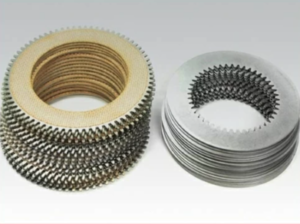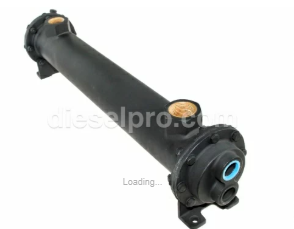
Parts Catalog for Twin Disc MG5090A Marine Transmissions
Overhaul Plate Kit For Twin Disc MG5090A Marine Transmission
Gasket Kits For Twin Disc MG5090A Marine Transmission
Importance of Marine Gear Safety When Servicing Twin Disc MG-5090A Marine Gear
Servicing the Twin Disc MG-5090A marine transmission requires rigorous attention to safety procedures to protect both the technician and the mechanical components. Marine gears like the MG-5090A operate under high pressures, intense loads, and elevated temperatures, and are often installed in environments where space is tight and access is limited. In this comprehensive safety guide, we will break down all major precautions, equipment handling recommendations, environmental considerations, and personal protective practices to ensure safe and effective maintenance.
This guide does not replace the original OEM service manual. For exact service procedures, torque specs, and tolerances, always refer to the official Twin Disc MG-5090A service documentation.
Personal Protective Equipment (PPE) Guidelines for Servicing Twin Disc MG-5090A Marine Gear

When working on the MG-5090A, personal protective equipment (PPE) is your first line of defense. These are the essentials:
- Gloves: Always wear cut-resistant gloves when handling tools or transmission components. Hydraulic fittings and sharp edges can cause lacerations.
- Safety Goggles: Eye protection is mandatory, especially during disassembly when pressurized oil or debris may eject.
- Steel-Toe Boots: To guard against injuries caused by dropped tools, heavy parts, or slips in marine environments.
- Coveralls or Fire-Resistant Clothing: Protects skin from hot surfaces, oil, and rotating parts.
- Hearing Protection: If servicing is being done near running engines or within an active engine room.
Each piece of PPE should be regularly inspected before use. Damaged or worn protective gear should be replaced immediately. Employers and crew supervisors should enforce PPE usage as a strict safety policy.
Electrical and Engine Power Safety Measures for Twin Disc MG-5090A Marine Gear
Before performing any maintenance or inspection, isolate and secure the engine and control systems.
Key Procedures:
- Disable Engine Start-Up: Remove the ignition keys and tag the system with a “Do Not Operate” lockout/tagout warning.
- Disconnect Electrical Systems: Shut down and isolate power to the starter motor, control modules, and any connected hydraulic systems.
- Check for Stored Energy: Capacitors, residual pressure in solenoids, and hydraulic accumulators must be safely discharged.
- Confirm Engine Cool-Down: Do not touch or open any part of the transmission until it has had time to cool. Residual heat can cause serious burns.
Failure to secure the power system can result in unexpected rotation of shafts, component ejection, or other mechanical hazards.
Temperature and Burn Hazards When Servicing Twin Disc MG-5090A Marine Gear
The MG-5090A operates under high load and friction, generating significant heat during operation. Burn injuries from hot oil, casings, or nearby engine components are common when cooling time is ignored.
Preventative Measures:
- Wait for Cool-Down: After engine shutdown, allow at least 30–45 minutes before beginning disassembly.
- Use Infrared Thermometers: Check surface temperatures if unsure.
- Never Open Hot Fittings or Plugs: Always assume pressure and heat are present unless confirmed otherwise.
Always verify that all system components have cooled to a safe temperature before starting any work.
Hydraulic Pressure Hazards in Twin Disc MG-5090A Marine Gear
Hydraulic circuits in the MG-5090A can retain pressure even after shutdown. A sudden release of this pressure can result in serious injury or fluid injection.
Hydraulic Safety Steps:
- Depressurize Systems: Use the pressure relief valves or follow the OEM depressurization steps before cracking open fittings.
- Wear Face and Hand Protection: Hydraulic fluid may release at high velocity.
- Avoid Standing Directly Over Fittings: Stand to the side when loosening any pressurized connection.
- Dispose of Hydraulic Fluids Properly: Follow environmental regulations and shop procedures.
Never underestimate the force of hydraulic energy—treat all lines and fittings as live until proven safe.
Clean Workspace and Tool Sanitation Practices for Twin Disc MG-5090A Marine Gear

The performance of marine gears like the MG-5090A relies heavily on a contamination-free system. Even microscopic debris can damage bearings, gears, and hydraulic valves.
Clean Handling Techniques:
- Use Clean, Lint-Free Rags: Avoid shop towels that shed fibers.
- Wipe Down Tools Before Use: Residual grime or metal shavings can cause contamination.
- Seal Exposed Ports: Use clean plugs and covers during disassembly to prevent foreign material entry.
- Store Parts in Covered Containers: Keep disassembled components in sealed bins away from workbench debris.
A disciplined cleanliness routine can prevent thousands of dollars in avoidable damage.
Safe Handling and Lifting of Heavy Components in Twin Disc MG-5090A Marine Gear
The MG-5090A weighs several hundred pounds and contains internal components such as clutch packs and planetary gears that are also individually heavy.
Safe Lifting Guidelines:
- Use Engine Hoists or Gantry Cranes: Always use rated lifting equipment with approved slings and anchor points.
- Never Lift Alone: Complex lifts should always be team-based or require a spotter.
- Secure Load Paths: Remove tripping hazards in lift zones and ensure a clear route.
- Use Proper Body Mechanics: Bend at the knees and avoid twisting while lifting.
Improper lifting causes severe injuries and damage to expensive transmission parts.
Fire, Oil, and Chemical Exposure Risks in Twin Disc MG-5090A Marine Gear Service Areas

Oil-soaked rags, leaked transmission fluid, and spilled diesel all contribute to elevated fire risks in marine engine rooms and work bays.
Fire Safety Steps:
- Use Proper Spill Containment Kits: Quickly isolate and clean fluid leaks.
- Eliminate Ignition Sources: No open flames or smoking in service areas.
- Use Fire-Resistant Waste Cans: Dispose of oily rags in designated bins with self-closing lids.
- Label and Store Fluids Safely: Avoid cross-contamination or incorrect fluid use.
Additionally, prolonged skin exposure to hydraulic fluid or synthetic oils can cause dermatitis or allergic reactions—always wear gloves.
Slip, Trip, and Fall Prevention When Servicing Twin Disc MG-5090A Marine Gear
Marine environments are inherently slippery. A fall on deck or in the engine room can lead to serious injuries, especially when carrying tools or working near sharp objects.
Recommendations:
- Use Slip-Resistant Matting: Especially around the transmission workspace.
- Clean Spills Immediately: Post “Wet Floor” signs if conditions persist.
- Keep Tools Organized: Use magnetic trays, carts, or tool belts to avoid clutter.
- Ensure Adequate Lighting: Poor visibility increases risk.
Each technician should be trained in fall prevention, especially in confined marine spaces.
Ventilation and Respiratory Considerations When Servicing Twin Disc MG-5090A Marine Gear
Marine service bays and engine rooms may contain exhaust fumes, fuel vapors, or aerosolized particles from solvents and cleaners.
Ventilation Guidelines:
- Work in Well-Ventilated Spaces: If servicing below deck, use powered ventilation fans.
- Avoid Inhalation of Spray Cleaners: Use masks rated for chemical protection.
- Don’t Run Engines Indoors: Only start engines with adequate exhaust ventilation.
- Check Carbon Monoxide Detectors: Especially in closed compartments.
Proper airflow protects against both long-term health issues and short-term dizziness or fainting.
Lockout/Tagout (LOTO) Procedures for Twin Disc MG-5090A Marine Gear
LOTO procedures ensure the machine remains in a safe state throughout service.
Key Steps:
- Tag the Ignition System: Use red tags that indicate the equipment is out of service.
- Lock the Circuit Breaker or Battery Switch: Prevents re-energization by uninformed personnel.
- Document the Procedure: Log the start and end of the service window, with technician initials.
LOTO is one of the most critical safety systems—never skip or bypass it.
Environmental and Compliance Considerations When Servicing Twin Disc MG-5090A Marine Gear
Safe maintenance also involves environmental compliance and community safety.
Responsible Practices:
- Use Spill Pans and Drip Mats: Capture leaking oil and transmission fluid.
- Recycle Used Fluids Properly: Follow local environmental disposal regulations.
- Avoid Fuel or Solvent Overuse: Prevent unnecessary marine discharge.
- Train in Emergency Spill Response: Know your vessel’s spill control procedures.
Whether docked or in dry dock, every repair should minimize environmental impact.
Emergency Readiness and Incident Protocols for Twin Disc MG-5090A Marine Gear Service

Being prepared for an emergency is just as important as preventing one.
Safety Planning:
- Know the Emergency Exits: Especially in enclosed engine compartments.
- Locate First Aid Kits: Ensure they are fully stocked and accessible.
- Have Emergency Numbers Visible: Post numbers for local coast guard, port authority, and medical support.
- Practice Safety Drills: Crew should regularly rehearse fire, spill, and injury scenarios.
Common Mistakes to Avoid When Servicing Twin Disc MG-5090A Marine Gear
- Assuming the Gearbox is Cool Without Checking: Always verify with a thermometer.
- Skipping Lockout/Tagout: One of the most dangerous oversights.
- Using the Wrong Tools: Damaging fasteners or slipping off bolts causes injuries.
- Failing to Use Lifting Equipment: Attempting manual lifting of heavy components is a major hazard.
- Not Wearing PPE: Even a minor service task can result in injury without gloves or eye protection.
Conclusion: Prioritizing Safety When Servicing Twin Disc MG-5090A Marine Gear
The MG-5090A is a premium-grade marine transmission designed for high performance and longevity—but that performance depends on skilled, safe maintenance. Each technician must treat safety as non-negotiable, not only to avoid injury but to ensure the long-term reliability of the vessel’s propulsion system.
This guide serves as a baseline of safety best practices. For torque specifications, disassembly steps, or advanced diagnostics, refer to the Twin Disc MG-5090A OEM service manual.
Parts Catalog for Twin Disc MG5090A Marine Transmissions
Overhaul Plate Kit For Twin Disc MG5090A Marine Transmission
Gasket Kits For Twin Disc MG5090A Marine Transmission
Videos About Twin Disc Transmissions
6 Reasons Your Twin Disc Transmission Has Low Oil Pressure
7 Reasons Your Twin Disc Transmission Is Overheating
3 Reasons Your Clutch Plates in Your Twin Disc Transmission Are Making Excessive Noise
Bull Gear On A Twin Disc Transmission
Rebuilt Twin Disc Transmissions



 Free US Calls: 1-888-433-4735
Free US Calls: 1-888-433-4735 International: 305-545-5588
International: 305-545-5588
